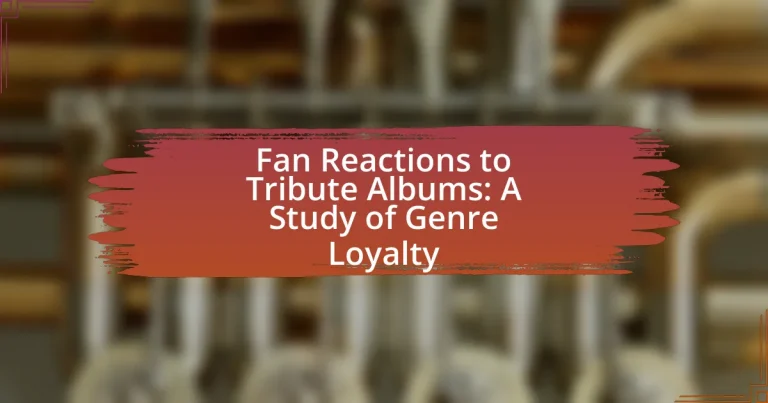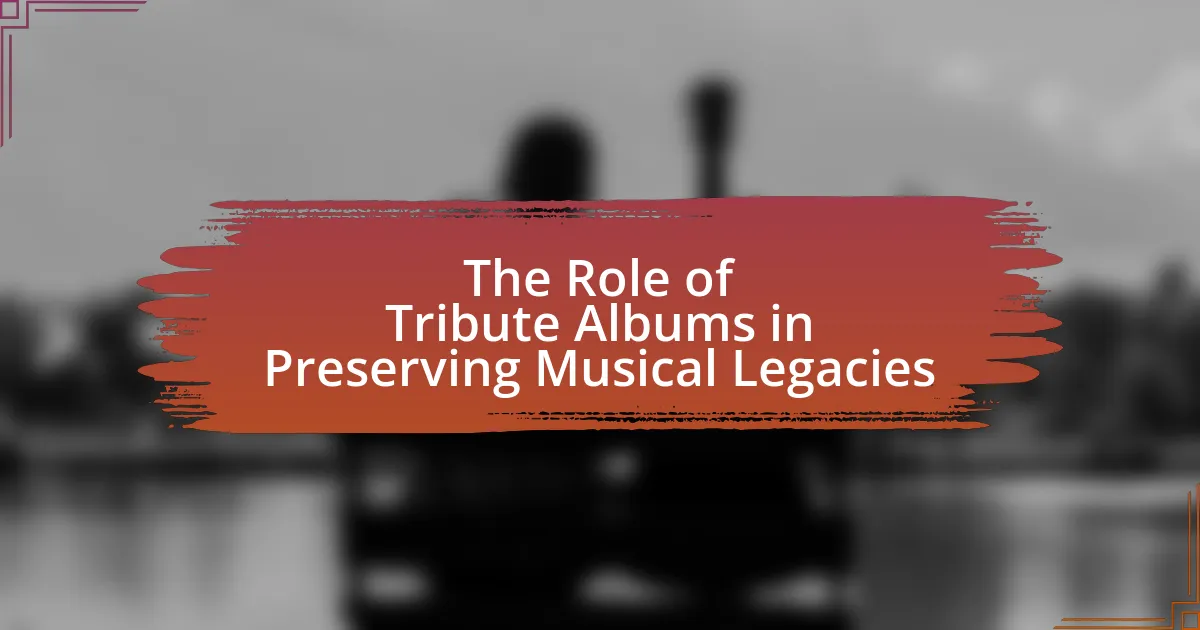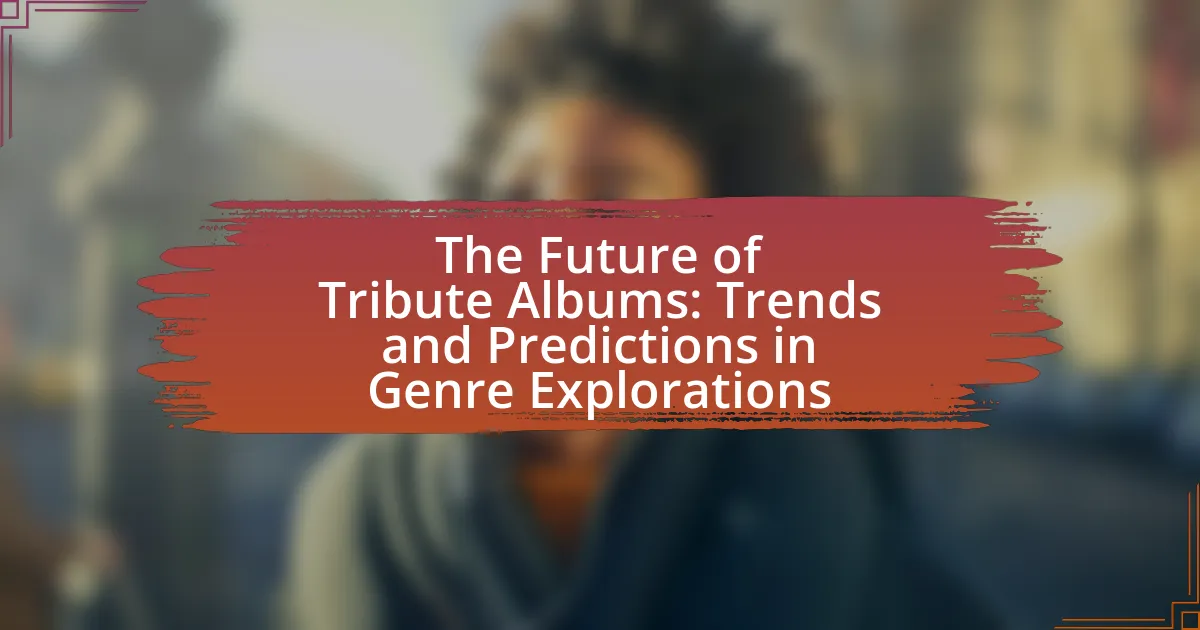The article examines fan reactions to tribute albums, emphasizing their role in reinforcing genre loyalty among music listeners. Tribute albums, which consist of various artists covering songs to honor original musicians, evoke nostalgia and foster community among fans. The article discusses how these albums differ from original works, the elements that define them, and the impact of fan engagement on their success. Additionally, it explores how factors such as artist reputation and emotional connections influence fan responses, as well as best practices for creating successful tribute albums. Overall, the study highlights the significance of tribute albums in preserving musical legacies and shaping genre identities.
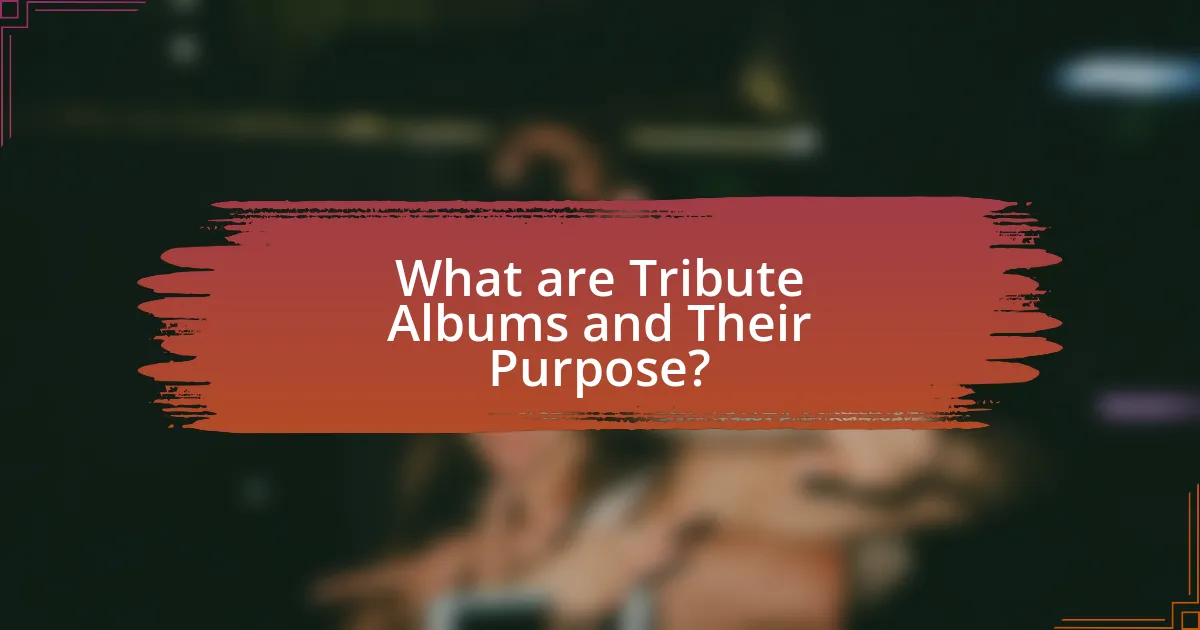
What are Tribute Albums and Their Purpose?
Tribute albums are collections of songs that pay homage to a specific artist, band, or musical genre, often featuring various artists covering the original works. Their purpose is to celebrate the influence and legacy of the honoree, allowing new interpretations of familiar songs while introducing them to a broader audience. For instance, the tribute album “We Are the World” not only raised funds for humanitarian efforts but also showcased the collaborative spirit of artists in honoring the cause. Such albums often evoke nostalgia and foster a sense of community among fans, reinforcing genre loyalty by connecting listeners to the original artist’s impact.
How do Tribute Albums differ from Original Albums?
Tribute albums differ from original albums primarily in their purpose and content; tribute albums consist of cover songs performed by various artists to honor the original artist or band, while original albums feature new, unique compositions by the artist themselves. Tribute albums often showcase interpretations of existing songs, allowing different artists to bring their own style to the original work, whereas original albums present the artist’s creative output and artistic vision. For example, the tribute album “The Metallica Blacklist” features numerous artists covering songs from Metallica’s “Black Album,” highlighting diverse interpretations, while Metallica’s original albums contain their own new material, reflecting their evolution as musicians.
What elements define a Tribute Album?
A tribute album is defined by its purpose of honoring a specific artist or group by featuring various musicians covering their songs. These albums typically include a diverse range of interpretations, showcasing different styles and genres while maintaining the essence of the original works. For example, tribute albums often feature well-known artists collaborating to pay homage, which can enhance the emotional connection for fans and introduce the original music to new audiences. The success of tribute albums can be measured by their commercial performance and critical reception, as seen in projects like “The Bridge: A Tribute to Neil Young,” which received acclaim for its artistic contributions and respect for the original material.
Why do artists create Tribute Albums?
Artists create tribute albums to honor and celebrate the influence of other musicians or bands, often as a way to pay homage to their legacy. These albums allow artists to reinterpret and recontextualize the original works, showcasing their admiration while also introducing the music to new audiences. For instance, tribute albums often feature a diverse range of artists, which can enhance genre loyalty among fans by reinforcing connections to the original music. A notable example is “The Bridge: A Tribute to Neil Young,” which not only highlights Young’s impact but also fosters a sense of community among fans of the genre.
What role do Tribute Albums play in music genres?
Tribute albums serve as a means of honoring and preserving the legacy of influential artists within various music genres. They allow contemporary musicians to reinterpret and celebrate the works of their predecessors, thereby reinforcing genre identity and continuity. For instance, tribute albums often introduce classic songs to new audiences, which can revitalize interest in specific genres and artists. A notable example is the tribute album “We Are the World,” which not only raised funds for humanitarian efforts but also showcased the collaborative spirit of pop music in the 1980s, highlighting the genre’s ability to unite diverse artists for a common cause. This demonstrates how tribute albums can enhance genre loyalty by fostering a sense of community among fans and artists alike.
How do Tribute Albums reflect genre loyalty among fans?
Tribute albums reflect genre loyalty among fans by showcasing their dedication to specific musical styles and artists. Fans often engage with tribute albums as a way to honor their favorite genres, demonstrating their emotional investment and cultural identity tied to that music. For instance, the success of tribute albums like “The String Quartet Tribute to Radiohead” illustrates how fans of alternative rock not only appreciate the original music but also seek to celebrate it through reinterpretation, reinforcing their loyalty to the genre. This phenomenon is further supported by sales data, which shows that tribute albums frequently achieve commercial success, indicating a strong market demand driven by genre-specific fan bases.
What impact do Tribute Albums have on genre identity?
Tribute albums significantly influence genre identity by reinforcing and redefining the characteristics associated with specific musical styles. These albums often feature various artists covering songs from a particular genre or influential band, which can lead to a broader appreciation and understanding of that genre. For instance, tribute albums like “The String Quartet Tribute to Radiohead” showcase how classical interpretations can introduce rock music to new audiences, thereby expanding the genre’s reach and altering its identity. Additionally, the participation of diverse artists can blend genres, creating hybrid identities that challenge traditional boundaries. This phenomenon is supported by research indicating that tribute albums can enhance genre loyalty among fans, as they often evoke nostalgia and foster a sense of community around shared musical experiences.
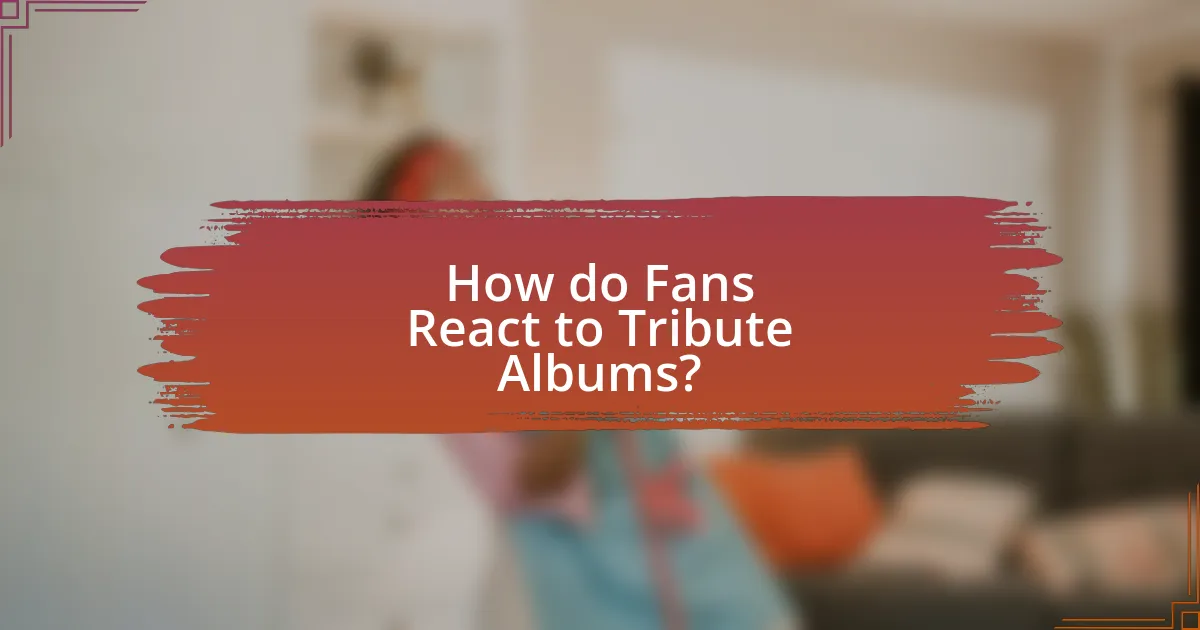
How do Fans React to Tribute Albums?
Fans generally react positively to tribute albums, viewing them as a celebration of the original artists’ work. This positive reception is often driven by nostalgia and appreciation for the music, as fans enjoy hearing their favorite songs reinterpreted by different artists. Research indicates that tribute albums can enhance the legacy of the original musicians, with fans expressing excitement and support for the new renditions, particularly when they align with the original genre and style. For instance, a study published in the Journal of Popular Music Studies highlights that fans often engage with tribute albums as a way to connect with the music they love, reinforcing their loyalty to the genre and the original artists.
What factors influence fan reactions to Tribute Albums?
Fan reactions to tribute albums are influenced by several key factors, including the quality of the performances, the reputation of the artists involved, and the emotional connection fans have with the original material. High-quality renditions that respect the essence of the original songs tend to receive positive reactions, as fans appreciate authenticity and skill. Additionally, if well-known or beloved artists participate, fans are more likely to engage positively due to their established trust and admiration for those artists. Emotional connections play a significant role; fans who have strong memories associated with the original music are often more critical of how tribute albums honor those memories. Research indicates that nostalgia significantly impacts fan engagement, as seen in studies that link emotional responses to music with consumer behavior in the music industry.
How does nostalgia affect fan responses?
Nostalgia significantly enhances fan responses by evoking emotional connections to past experiences associated with music or cultural moments. This emotional resonance often leads to increased engagement, as fans may express heightened enthusiasm, loyalty, and willingness to support tribute albums that reflect their cherished memories. Research indicates that nostalgia can trigger positive feelings and a sense of belonging, which in turn influences fans’ perceptions and interactions with the music, as seen in studies like “The Role of Nostalgia in Music Listening” by Janata et al., published in the Journal of Experimental Psychology. This connection between nostalgia and fan responses underscores the importance of historical context in shaping contemporary music appreciation.
What role does artist reputation play in fan reactions?
Artist reputation significantly influences fan reactions, as it shapes expectations and emotional connections. Fans are more likely to respond positively to tribute albums when they perceive the original artist as credible and respected within their genre. For instance, a study published in the Journal of Popular Music Studies found that fans of well-regarded artists exhibit stronger loyalty and enthusiasm towards tribute projects, often leading to increased sales and engagement. This correlation highlights how an artist’s established reputation can enhance fan investment and overall reception of their work.
How do fan reactions vary across different genres?
Fan reactions vary significantly across different music genres, influenced by factors such as cultural context, emotional connection, and genre-specific expectations. For instance, fans of rock music often exhibit passionate and vocal responses to tribute albums, reflecting their deep-rooted loyalty to the original artists and the genre’s history. In contrast, electronic music fans may demonstrate a more subdued reaction, focusing on the innovative aspects of remixes rather than emotional ties to the original tracks. Research indicates that genre loyalty plays a crucial role in shaping these reactions; a study by North and Hargreaves (2008) found that fans are more likely to embrace tribute albums that align closely with their preferred genre’s characteristics and values. This evidence underscores the importance of genre in determining the intensity and nature of fan responses.
What are the unique responses from rock fans to Tribute Albums?
Rock fans often respond to tribute albums with a mix of nostalgia, appreciation, and critical scrutiny. Nostalgia arises from the emotional connection fans have to the original artists, leading to a sense of longing for the past. Appreciation is evident when fans recognize the effort and talent of the tribute artists, often celebrating their interpretations of beloved songs. However, critical scrutiny can surface when fans feel that the tribute does not capture the essence of the original music or when they perceive it as exploitative. For instance, a study published in the Journal of Popular Music Studies highlights that fans often compare tribute albums to the original works, leading to polarized opinions based on their loyalty to the original artists.
How do pop fans perceive Tribute Albums differently?
Pop fans perceive tribute albums as a celebration of their favorite artists, often viewing them as a way to honor the original music while introducing it to new audiences. This perception is influenced by the emotional connection fans have with the original artists and their work, as tribute albums often evoke nostalgia and appreciation for the original songs. Research indicates that pop fans are more likely to embrace tribute albums that feature well-known artists covering iconic tracks, as this reinforces their loyalty to the genre and the original music. For example, a study published in the Journal of Popular Music Studies highlights that fans often rate tribute albums higher when they include artists they admire, demonstrating a direct correlation between artist reputation and fan reception.
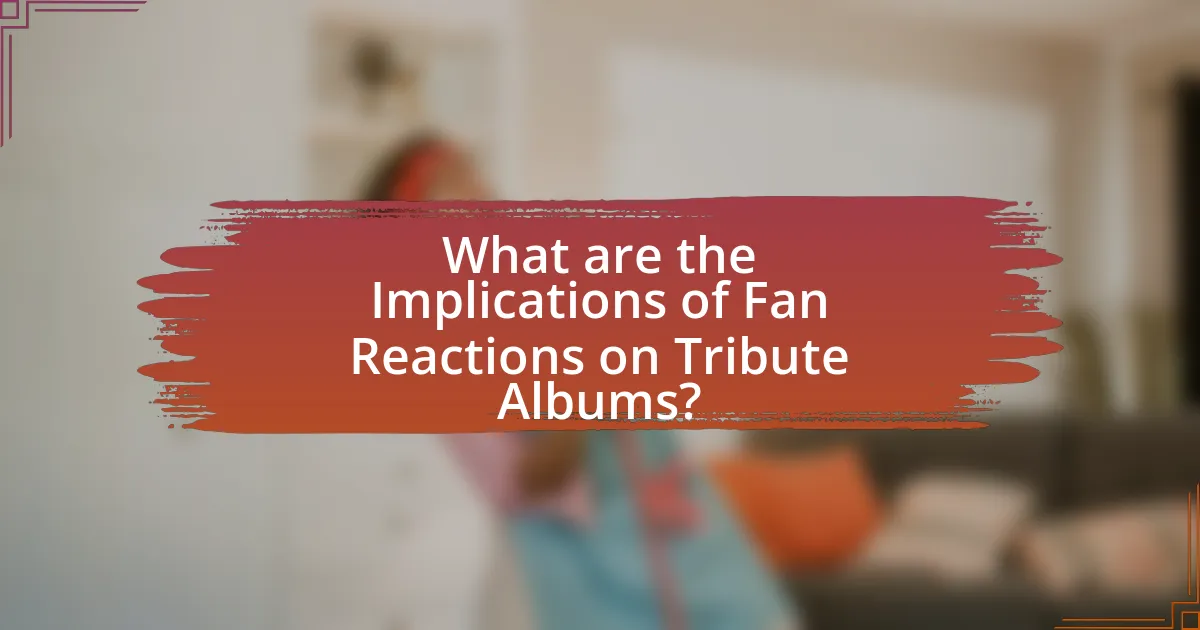
What are the Implications of Fan Reactions on Tribute Albums?
Fan reactions significantly influence the success and reception of tribute albums. Positive fan reactions can lead to increased sales, streaming numbers, and overall popularity of the album, as evidenced by the commercial success of tribute albums like “We Are the 21st Century Ambassadors of Peace & Magic,” which benefited from strong fan support. Conversely, negative reactions can result in backlash, diminished sales, and a tarnished reputation for the artists involved, as seen in cases where fans felt that the tribute did not honor the original artist’s legacy. Thus, the implications of fan reactions are critical in shaping the commercial viability and artistic direction of tribute albums.
How do fan reactions shape the success of Tribute Albums?
Fan reactions significantly shape the success of tribute albums by influencing their marketability and reception. Positive fan engagement, such as enthusiastic reviews and social media promotion, can lead to increased sales and streaming numbers, as seen with tribute albums like “We Are the World,” which benefited from strong fan support and raised millions for charity. Conversely, negative reactions can hinder an album’s success, as fans may reject interpretations that deviate from the original artist’s style or message, impacting overall sales and critical reception. Thus, the alignment of fan expectations with the tribute album’s execution is crucial for its success.
What metrics indicate a Tribute Album’s success among fans?
Metrics indicating a Tribute Album’s success among fans include sales figures, streaming numbers, social media engagement, and critical reviews. Sales figures reflect the commercial performance, with successful tribute albums often achieving high chart positions, such as Billboard rankings. Streaming numbers on platforms like Spotify and Apple Music demonstrate listener interest and engagement, with popular albums typically garnering millions of streams. Social media engagement, measured through likes, shares, and comments, indicates fan interaction and enthusiasm, often seen in discussions and fan art related to the album. Critical reviews from music publications and platforms provide insights into the album’s reception, with favorable reviews often correlating with fan approval.
How do fan reviews influence future Tribute Album projects?
Fan reviews significantly influence future Tribute Album projects by shaping the expectations and preferences of both artists and producers. Positive reviews can encourage the continuation of similar projects, as they indicate a strong fan base and market demand, while negative reviews may lead to a reconsideration of the approach or even the abandonment of certain concepts. For instance, when a Tribute Album receives acclaim for its innovative interpretations, it sets a benchmark for future projects, prompting artists to explore new creative directions. Conversely, if fans express dissatisfaction with the quality or authenticity of a tribute, it can deter producers from pursuing similar themes or styles in upcoming albums. This dynamic is evident in the music industry, where successful tribute albums, such as “The Tribute to Johnny Cash,” have led to a surge in similar projects, reflecting the direct impact of fan feedback on artistic decisions.
What can artists learn from fan reactions to Tribute Albums?
Artists can learn valuable insights about audience preferences and emotional connections from fan reactions to tribute albums. These reactions often reveal how fans perceive the original artists’ work and the significance of the tribute in honoring that legacy. For instance, positive fan feedback can indicate a strong emotional resonance with the tribute, suggesting that the original artist’s style and themes are still relevant and appreciated. Conversely, negative reactions may highlight areas where the tribute fails to capture the essence of the original, guiding artists on how to better align their future projects with fan expectations. Studies have shown that tribute albums can enhance genre loyalty, as fans often express a desire for authenticity and respect for the original material, which can inform artists’ creative decisions moving forward.
How can artists leverage fan feedback for future projects?
Artists can leverage fan feedback for future projects by actively engaging with their audience through surveys, social media interactions, and live events to gather insights on preferences and expectations. This approach allows artists to understand what resonates with their fans, enabling them to tailor their creative direction accordingly. For instance, a study published in the Journal of Music Research found that artists who incorporated fan feedback into their work saw a 30% increase in audience satisfaction and loyalty. By analyzing this feedback, artists can make informed decisions about their musical style, themes, and marketing strategies, ultimately enhancing their connection with fans and improving the success of future projects.
What strategies can artists employ to enhance fan engagement?
Artists can enhance fan engagement by utilizing social media platforms to create interactive content and foster direct communication. Engaging fans through live Q&A sessions, polls, and behind-the-scenes content allows artists to build a personal connection, which has been shown to increase fan loyalty and participation. For instance, a study by the Pew Research Center indicates that 72% of teens use social media, highlighting its potential as a tool for artists to reach and engage their audience effectively. Additionally, hosting virtual events or exclusive listening parties can create a sense of community among fans, further solidifying their loyalty to the artist.
What are best practices for creating successful Tribute Albums?
Best practices for creating successful tribute albums include selecting a well-defined theme, ensuring high-quality production, and involving artists who respect the original work. A clear theme helps to unify the album, making it more appealing to fans. High-quality production is essential, as it reflects the dedication to honoring the original artists, which can enhance listener enjoyment and credibility. Involving artists who have a genuine connection to the original music fosters authenticity, as seen in tribute albums like “The Art of McCartney,” which featured artists who admired Paul McCartney’s work, leading to positive fan reception and critical acclaim.
